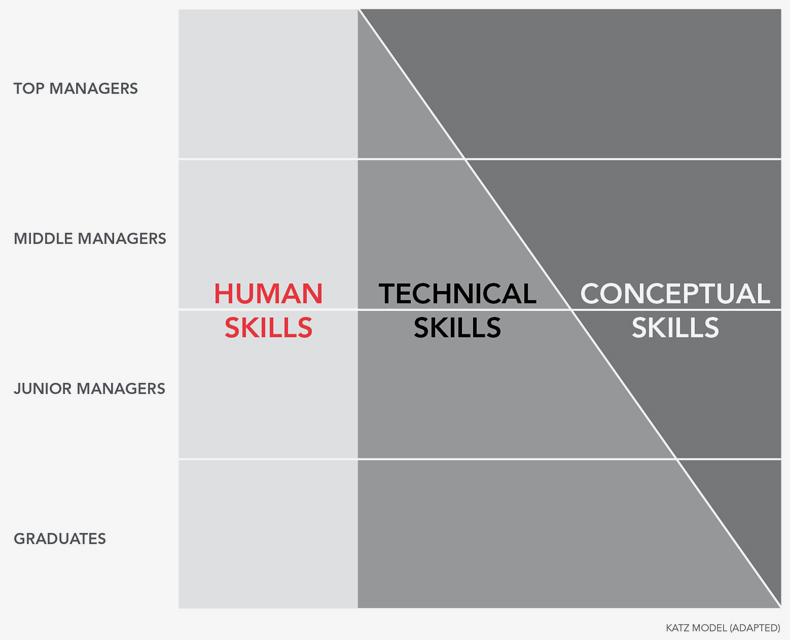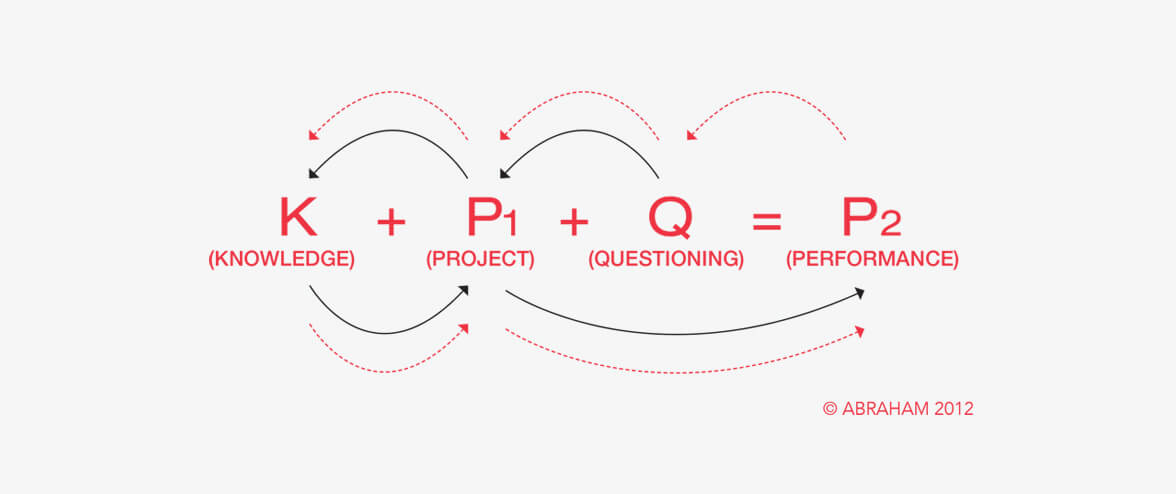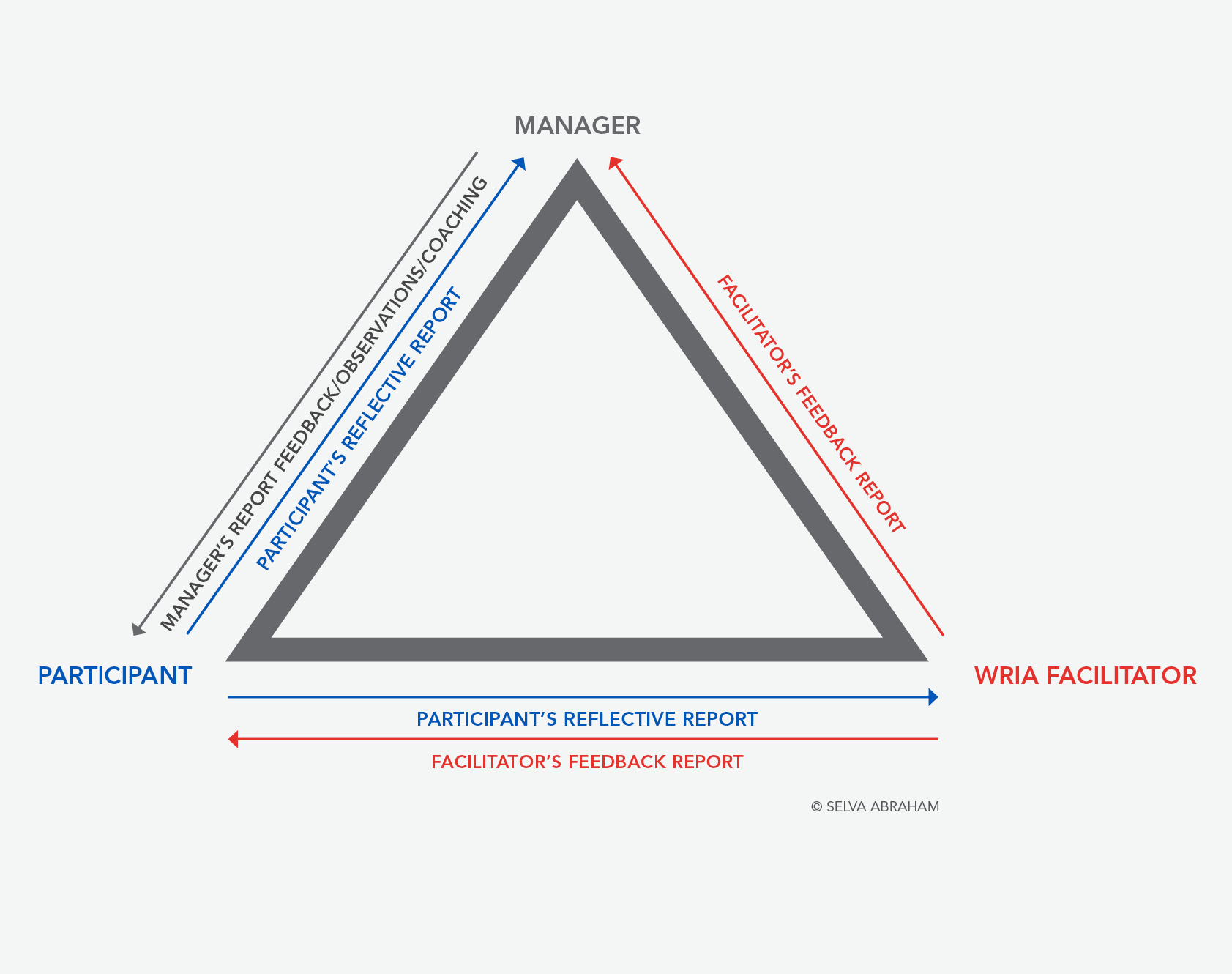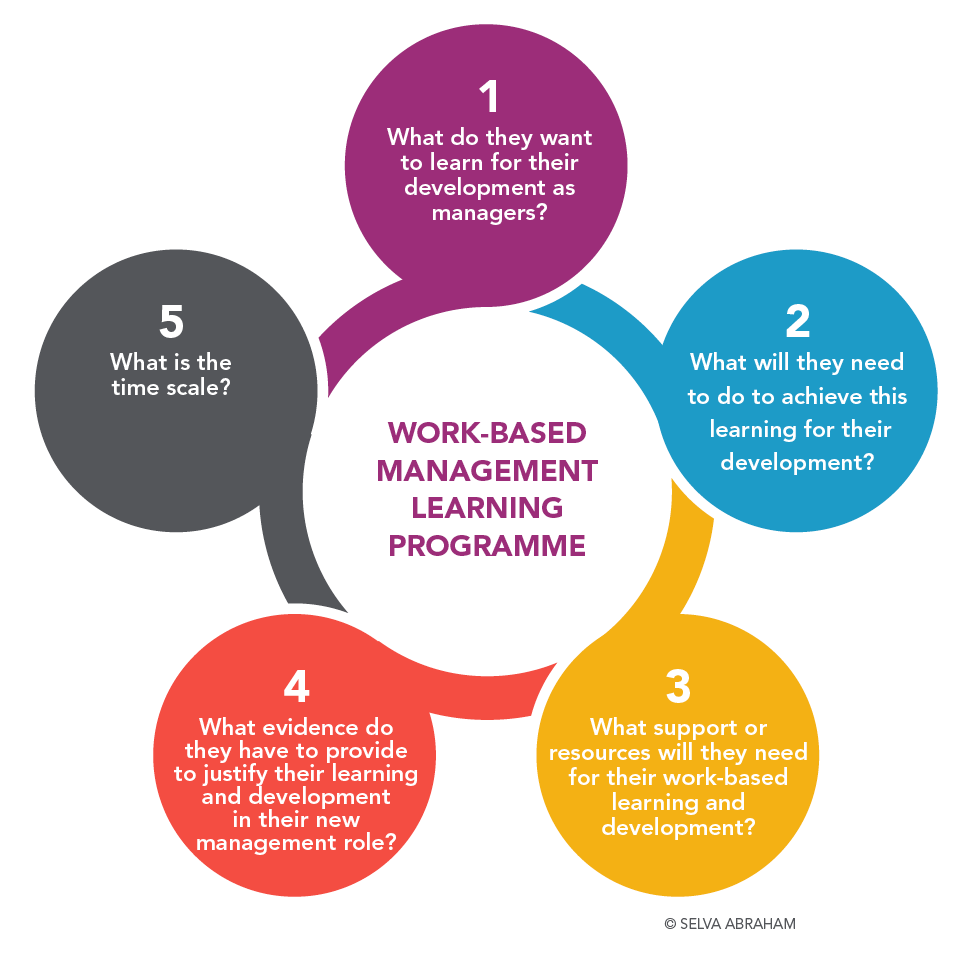The skills required of managers as they progress in management and business careers are Human Skills, Technical Skills and Conceptual Skills, as shown in the diagram below. The need for Human Skills remains constant throughout a manager’s career path. In contrast, the need for Technical Skills decreases with the increasing seniority of the manager, whilst the need for Conceptual Skills in the business and management areas becomes increasingly important for the manager with every move into a higher management position.Therefore, the skills required in the human and conceptual levels of management learning will differ depending on the individual’s level in the organisation, be it a graduate, middle or top management.
WRIA is committed to developing people who are in the transition of change into their first job in an organisation as graduates, their first management job, a new middle management position or a new business role where they require new business and management concepts and processes, including human skills.
Since participants would have acquired technical skills as part of their higher education or college education or previous work experience, prior to joining an organisation, WRIA programmes focus only on developing the human and business and management conceptual learning skills of participants.
SKILLS OF MANAGERS

All WRIA programmes use the WAL formula of
K + P1 + Q = P2 as shown below:

During a WRIA programme, participants will:
K
(knowledge)
Reflect and apply relevant knowledge (K) in the planning and implementation of the Work-Based Learning (WBL) project.
P1
(project)
Critically reflect on a WBL project (P1) to address a problem or need in their departments.
Q
(questioning)
Question (Q) how to solve a problem by searching for ideas to help plan the WBL project.
P2
(performance)
Achieve performance outcomes (P2), including the WBL project outcomes, process outcomes, and learning outcomes.
The Work-Based Learning Project
The work-based project will develop the participants who are in transition to become work-ready in an authentic and engaging way. As the participants plan and implement their projects for or with their managers, they will learn how to take initiative and responsibility, build their confidence, solve problems, work with resources and people, communicate ideas and manage themselves more effectively. They become empowered to make a difference for themselves and their team members as they work with, work for, and work through their people.
Critical Reflection
The process of undertaking the work-based project is built around critical reflection and the learnings that flow from the work on the project. So often in the busyness of our lives we tend to react quickly to what is before us and move on to the next thing that needs to be done. Careful thought, meditation and reflection about what we are faced with and what we might do, generally brings considerable benefit and richness to our actions. We use the term “reflection” to cover this ability to engage in careful thinking and finding insights about what has happened and what we have learned. WRIA programmes are designed to allow this to happen through its action learning and reflective practice processes.
Participant Support
The participants will be supported throughout the programme at allocated times by a WRIA programme facilitator who will provide written feedback on their reports as well as present webinars for their cohort to discuss their progress on the development of their projects, issues encountered and potential solutions to the issues and challenges. In addition, the participants will meet their respective managers regularly on their WBL projects and other related work assigned to them.
Input -> Process -> Output
The diagram below illustrates the input, process and outputs of the work-based learning approach used in WRIA programmes.
INPUT
KNOWLEDGE OF:
- Business or management concepts
- Understanding action learning and reflective
practice in relation to work-based learning
PROCESS
REFLECTING ON:
- Individual and team learning outcomes
- Self in relation to team members/others
- Self in relation to the Manager
IN THE CONTEXT OF
the knowledge and project and process outcomes
OUTPUT
REFLECTING REPORTS ON:
- Individual and team learning outcomes
- Self in relation to team members/others
- Self in relation to the Manager
IN THE CONTEXT OF
the knowledge and project and process outcomes
A unique feature of the WRIA programmes is the triangulated approach used in validating the progress of the participant, as shown in the diagram below.
The participant will submit a monthly reflective report on the development of their work readiness skills to the WRIA facilitator as well as to their manager. The WRIA facilitator will provide written feedback on each report to both the participant and their manager, and present webinars to discuss common themes faced by the participants and potential solutions.
This process also provides an opportunity for the manager to monitor the participant’s development of their work readiness skills and coach and mentor the participant. Thus, the participant receives feedback from both the WRIA facilitator and the manager.

All programmes at WRIA use the work-based learning approach including action learning and reflective practice processes which require participants to:
- Identify a meaningful workplace issue,
- Address this issue through a real-life work-based project that they undertake with their team,
- Apply management and business concepts to the work-based project in the organisation,
- Reflect with their team on the work-based project and other interpersonal and inter-group experiences, and
- Critically analyse and engage in reflective thinking.
WRIA delivers the following work-based learning and development programmes which are grounded in action learning and reflective practice:
More recently, the transition to a first job has received a great deal of attention, with work in the graduate work readiness field being critical to the successful transition of graduates from university or college to the workplace.
As a result, WRIA worked on the findings of research undertaken by Australian researchers to develop the Graduate Work Readiness programme for the region.
The Graduate Work Readiness programme focuses on the development of skills and strategies required when new graduates take up their first jobs in the workplace.
As new graduates, they have been recruited for their knowledge and technical skills, but when joining a new organisation or beginning in a new work setting, they have to adapt to the new environment.
Each workplace is different and each one needs to be understood and appreciated for what it is. This requires a willingness by the graduate to engage in systematic reflection about the new environment and the required work readiness skills.
All WRIA programmes are designed for cohorts of 20 participants, on an either an in-company basis or on an inter-company basis for two or three organisations.
This programme is designed to facilitate this in a time-efficient and practical manner. The learning and development for this work-based learning programme is on the job and takes place at work through a real-life work-based project where the graduate focuses on developing their human skills which cover the following dimensions:
- Communication
- Working with others
- Problem-solving
- Decision making
- Responding to conflict
- Organisational politics
- Self-management
- Awareness of leadership styles
The Work-Based Management Learning Programmes provide the opportunity for new managers and current managers, who are moving into a new business or management area, to develop an understanding about that discipline in order to be work-ready in that new role. The themes of this Work-Based Management Learning Programmes will be related to individual development in business or management through a work-based learning project and process.
Organisations and participants have to be clear about what they want to achieve from the Work-Based Management Learning Programmes. They should think through precisely what they would like to achieve, the boundaries within which they have to work, the resources available to them and the timescale involved.
They will need to consider the learning and development questions as shown in the diagram.
The questions raised in the diagram are the essentials with which WRIA will work with organisations to establish a work-based management and business learning programme for its managers in transition.
This programme requires 15 participants from one or more organisations.
NEW MANAGERS AND MANAGERS IN TRANSITION



